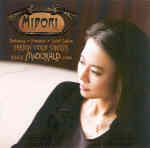Midori and pianist partner Robert McDonald tear into Poulenc’s melodramatic Violin Sonata with unbridled ferocity, clearly enjoying the opportunities offered to display reckless excesses of despair. Their willingness to push the tempo and screw the music’s tension ever higher pays big rewards in the final Presto tragico, making the disintegration of texture in the closing bars all the more shocking. The Debussy sonata is finer still. Here, at tempos almost a minute slower in each movement than the classic Grumiaux/Castagnone recording on Philips, Midori/McDonald find more light and shade in the outer movements than we might have thought possible. This elusive piece has no slow movement, but here we notice that it does have some slow music within movements, and in emphasizing contrasts of all sorts–of texture, dynamics, speed, rhythmic tension–the piece sounds larger, deeper, more complex and emotionally satisfying than most other performances reveal. This is unquestionably a remarkable interpretation.
A silky and suave Saint-Saëns Violin Sonata No. 1 closes the program. This piece has the same structure as the composer’s famous Organ Symphony–four movements arranged in two linked pairs–and here there’s no probing for depths that the music doesn’t have. Instead, the players offer shapely phrasing, a euphonious blending of tones (the adagio is especially gorgeous), and the kind of lightness without superficiality that this expertly crafted music requires. Excellently balanced sound allows the natural interplay between instruments to register with exemplary clarity. As with her previous recording of sonatas by Elgar and Franck, this disc adds a new dimension to Midori’s art as a chamber player of great insight and taste. A very enjoyable listen indeed. [9/21/2002]
































